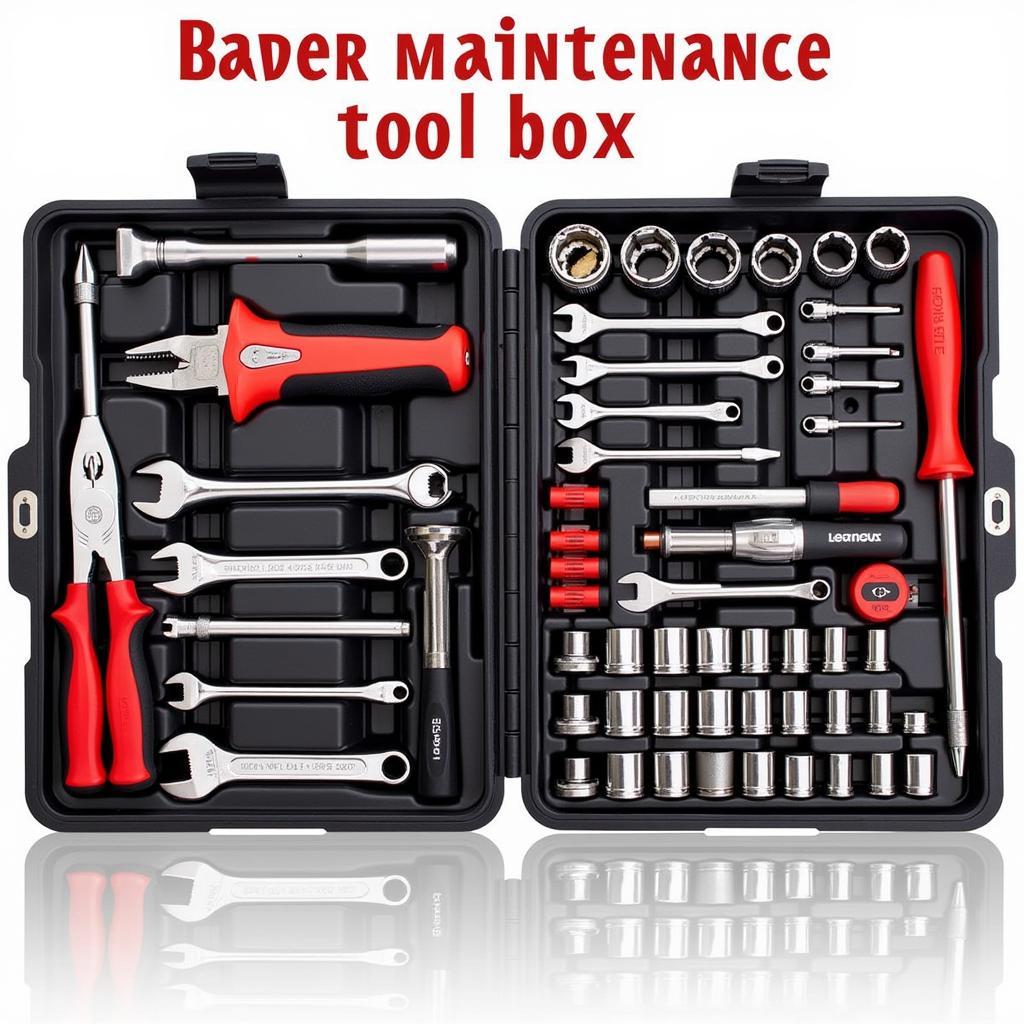Working on your car can be intimidating if you don’t have the right tools. Whether you’re a seasoned mechanic or a DIY enthusiast just starting out, having a well-equipped toolbox is essential for tackling car repairs and maintenance efficiently and safely. This article will cover the must-have tools to work on cars, from basic hand tools to more specialized equipment, empowering you to handle various automotive tasks.
Essential Hand Tools for Car Maintenance
Every car owner should have a basic set of hand tools for simple tasks like changing a tire or replacing a battery. These include:
- Screwdrivers: A set of Phillips and flathead screwdrivers in various sizes is crucial for removing screws and fasteners.
- Wrenches: Both combination wrenches (with an open end and a box end) and adjustable wrenches are essential for tightening and loosening nuts and bolts.
- Pliers: Needle-nose pliers are perfect for reaching tight spaces, while slip-joint pliers are versatile for gripping and turning.
- Socket Set: A socket set with a ratchet handle allows for faster and more efficient removal of nuts and bolts, especially in confined areas.
- Hammer: A ball-peen hammer is useful for tapping and shaping metal parts.
- Torque Wrench: This tool ensures that fasteners are tightened to the correct specifications, preventing damage to delicate components.
Looking for tools compatible with various car models? Check out the selection of tools to use with cars.
 Essential Hand Tools for Car Maintenance Set
Essential Hand Tools for Car Maintenance Set
Diagnostic Tools for Troubleshooting
Modern cars rely heavily on electronic systems. Therefore, having diagnostic tools is essential for identifying and resolving issues:
- OBD-II Scanner: This device connects to your car’s diagnostic port and reads error codes, providing valuable insights into the problem.
- Multimeter: A multimeter measures voltage, current, and resistance, helping diagnose electrical problems.
- Test Light: A simple test light can quickly check for power or ground issues in electrical circuits.
Having the right diagnostic tools can save you time and money in the long run.
Power Tools for Advanced Repairs
For more complex repairs, power tools can significantly speed up the process:
- Impact Wrench: This tool quickly removes and installs lug nuts, making tire changes a breeze.
- Drill: A cordless drill with various bits is invaluable for drilling holes and driving screws.
- Angle Grinder: An angle grinder is useful for cutting and grinding metal.
Thinking of customizing your car? You might find some interesting options in fancy tools for car.
Safety Equipment is Non-Negotiable
Safety should always be your top priority when working on cars. Essential safety equipment includes:
- Safety Glasses: Protect your eyes from flying debris and chemicals.
- Gloves: Protect your hands from grease, grime, and sharp objects.
- Jack Stands: Never work under a car supported only by a jack. Always use jack stands for added safety.
- Wheel Chocks: Prevent the car from rolling while you’re working on it.
Must-Have Tools for Specific Car Tasks
Certain tasks require specialized tools. For instance, if you plan on painting your car, you’ll need car painting tools. Similarly, you might be interested in car tools pedagio if you are frequently on toll roads.
Conclusion
Having the right must-have tools to work on cars empowers you to perform routine maintenance, diagnose problems, and even tackle some repairs yourself. Investing in quality tools will save you money in the long run and give you the confidence to keep your car in top condition.
FAQ
- What is the most important tool for car maintenance? A good set of wrenches and sockets is fundamental for most car maintenance tasks.
- Do I need an OBD-II scanner if my car is old? OBD-II scanners are essential for diagnosing issues in most cars manufactured after 1996.
- What are jack stands used for? Jack stands provide a stable and secure support for your car when working underneath it, ensuring your safety.
- Are power tools necessary for DIY car repairs? While not strictly necessary for all repairs, power tools can make many tasks significantly easier and faster.
- What type of gloves should I use when working on my car? Nitrile gloves are a good choice as they offer good protection against grease, chemicals, and punctures.
- How do I choose the right size wrench? The size of the wrench corresponds to the size of the nut or bolt you need to tighten or loosen.
- Where can I learn more about using these tools? There are many resources available online and in libraries that offer detailed instructions and tutorials on using various car repair tools.
Common Car Issues and Related Tools
Some common car issues, such as a flat tire, require specific tools like a lug wrench, jack, and jack stands. Other issues, like electrical problems, might need a multimeter or a test light for diagnosis.
Further Exploration
For more specialized tools, you might find the list of top ten skin care tools helpful, even though it’s not directly related to cars. This illustrates how diverse tooling needs can be.
Need help with your car diagnostics? Contact us on WhatsApp: +1(641)206-8880, Email: [email protected] or visit us at 910 Cedar Lane, Chicago, IL 60605, USA. Our customer service team is available 24/7.

Leave a Reply